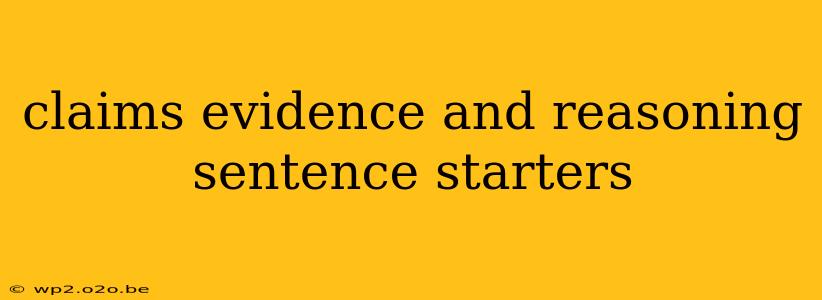Claims, Evidence, and Reasoning: Sentence Starters to Strengthen Your Arguments
Crafting compelling arguments requires more than just stating your opinion. You need to build a solid foundation using claims, evidence, and reasoning. This post provides a range of sentence starters to help you effectively structure your arguments, making them clear, persuasive, and easy to follow. Whether you're writing an essay, a research paper, or even a persuasive email, these sentence starters will empower you to articulate your points with confidence.
Starting with Your Claim (Thesis Statement & Topic Sentences)
Your claim is your main point, the central argument you're trying to prove. Here are some sentence starters to introduce your claims powerfully:
- Direct and assertive: "This essay argues that...", "My central claim is that...", "This paper will demonstrate that...", "I contend that..."
- More nuanced: "It is argued here that...", "This study suggests that...", "The evidence points towards...", "A compelling case can be made for..."
- Problem/solution oriented: "Addressing the issue of X requires understanding that...", "To solve the problem of Y, it's crucial to consider...", "The solution to Z lies in recognizing..."
Presenting Your Evidence (Data, Facts, Examples)
Evidence is the factual support for your claim. Strong evidence makes your argument believable. These sentence starters will help you integrate evidence seamlessly:
- Introducing evidence directly: "Data from [source] indicates that...", "Research by [author] shows that...", "For example...", "As demonstrated by...", "The findings suggest..."
- Highlighting the significance of evidence: "Crucially, [evidence] reveals...", "Significantly, [evidence] demonstrates...", "This is important because...", "This supports the claim that..."
- Comparing and contrasting evidence: "In contrast to [evidence], [evidence] shows...", "While [evidence] suggests..., [evidence] counters this by..."
Connecting Your Evidence to Your Claim (Reasoning & Analysis)
Reasoning is the logical bridge between your evidence and your claim. It explains why your evidence supports your claim. These sentence starters will help you build this crucial connection:
- Explaining the significance of the evidence: "This evidence suggests that...", "This implies that...", "Therefore...", "Consequently...", "This leads to the conclusion that..."
- Showing cause and effect: "As a result of [evidence],...", "Because of [evidence],...", "This caused...", "This contributed to..."
- Analyzing the evidence critically: "While this evidence is compelling, it's important to note...", "A potential limitation of this evidence is...", "However, further research is needed to determine..."
- Drawing inferences: "This strongly suggests...", "It can be inferred from this that...", "This evidence points towards..."
- Making generalizations: "Based on this evidence, we can conclude that...", "These findings generally suggest..."
Strengthening Your Argument with Counterarguments & Rebuttals
Addressing potential counterarguments demonstrates a thorough understanding of the issue and enhances the credibility of your argument.
- Acknowledging counterarguments: "Some might argue that...", "Opponents of this view might claim that...", "It's important to consider the counterargument that..."
- Refuting counterarguments: "However, this argument fails to consider...", "While this is a valid point, it overlooks...", "This argument is flawed because..."
By utilizing these sentence starters, you can structure your arguments effectively, ensuring clarity, coherence, and persuasive power. Remember to always cite your sources correctly and maintain a consistent and formal tone. With practice, these sentence starters will become second nature, helping you craft compelling and convincing arguments every time.

